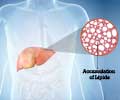Atherosclerotic plaques are found to be associated with the central nervous system, as their main conduit.

‘Atherosclerotic plaques (composed of an accumulation of cholesterol, fibrous tissue, and immune cells) are found to be associated with the central nervous system, as their main conduit.’





"When there is an atherosclerotic plaque, aggregates of immune cells also formed in the outer connective tissue of the blood vessel called the adventitia. Interestingly, these aggregates bear similarities to a lymph node which – under healthy conditions, regulate our immune responses. Importantly, the connective tissue surrounding arteries is rich in nerve fibers that, as our work has now shown, establish a direct connection between the plaque and the brain. In fact, this adventitia tissue is used by the nervous system as main conduit to reach all organs throughout the body,” says Professor Daniela Carnevale, Department of Angiocardioneurology and Translational Medicine of Neuromed and full professor at the Sapienza University of Rome and senior author of the publication. "ABC" as Therapeutic Potential
The study helped the team reconstruct the entire path of nerve fibers, up to the central nervous system — "At this point , we were able to see that signals coming from the plaque, once they reach the brain, influence the autonomic nervous system through the vagus nerve (the one portion of the nervous system controlling most of our organs and visceral functions, ed) down to the spleen. Here, specific immune cells are activated and enter the blood circulation, leading to the progression of the plaques themselves ," says Carnevale.The authors defined this real circuit as "ABC" or "artery-brain circuit". These lines of evidence state that the stability of atherosclerotic plaque is one of the most clinically relevant traits in evaluating the severity of the disease.
The findings also set a new target for innovative therapies for atherosclerosis through its significant translational potential.
Source-Medindia












